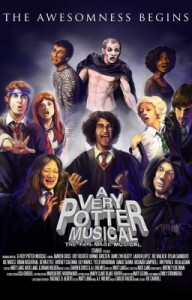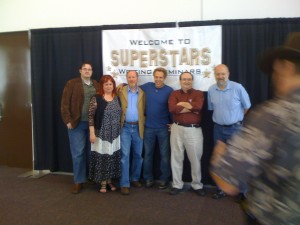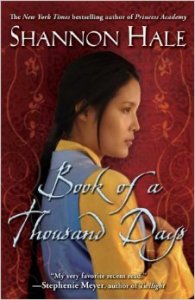 As you can tell, quite a few of us at Fictorians love David Farland’s workshops. I’m no exception, so I admit that this post is based on information I received at his outlining workshop. I won’t do him justice, but maybe my perspective on this topic will be of use.
As you can tell, quite a few of us at Fictorians love David Farland’s workshops. I’m no exception, so I admit that this post is based on information I received at his outlining workshop. I won’t do him justice, but maybe my perspective on this topic will be of use.
(Btw, did they spell awesomeness wrong in the picture to the left? Not just me, right? OK, let’s move on.)
So, every story has a protagonist and an antagonist, right? The thing is, the best stories have so much more, though I’ll start with the basics:
Protagonist: Our protagonist is our main girl/guy, but remember that a story can have more than one protagonist. You can have a main protagonist and a secondary protagonist, both of whose stories weave together in synchronicity.
*In Harry Potter, though Ron and Hermione might be considered protagonists, the entire story is told from Harry’s pov, and the focus of the story is Harry. I see him as the only real protagonist.
Antagonist: The main bad dude/dudette. The person, place, or thing that stands in the way of our protagonist(s) achieving their goal(s). Yep, I said it, the antagonist does not have to be a person. It can be nature as in mountains in the middle of nowhere, crippling emotions, a monster, or any of a vast number of possibilities. Don’t limit yourself.
*Harry Potter: Duh, Voldemort.
Contagonist: I think of the contagonist as the antagonist’s knowing (or unknowing) minion. This is the one getting in the way, but not the one originally instigating the problems. Having a contagonist allows for plot twists and surprises. They’re a great way to lead the reader in one direction then twist them entirely around into another.
*Harry Potter: Some might say Malfoy, but I consider Severus Snape to be the main contagonist. We’re always unsure of his motives, and he makes himself entirely dislikable, so dying for Harry becomes a great reveal.
Heckler: The thorn in the protagonist’s side, always willing to jeer, taunt, make life difficult, and generally get in the way. Not necessarily against the protagonist’s goals, but always willing to take our protagonist down a peg or two.
*Harry Potter: Through most of the series, this role goes almost entirely to Draco Malfoy. And we love to hate him SO MUCH.
Love Interest: It’s meant to be! *insert pink and red hearts* This is the person your protagonist likes, comes to love, hates but can’t deny their attraction to. Whatever, this is the one who makes the sparks fly.
*Harry Potter: Ginny Weasley, though it sure takes them a while, and their kiss in the movie is beyond lame, in my personal opinion.
Seducer: This is the person who diverts the protagonist from the love interest, whether intentionally or otherwise. This helps the tension in the romantic subplot.
*Harry Potter: Cho Chang, though their Valentine’s date made me a bit nauseous.
Sidekick: This is the supporting character, there when the hero(ine) needs them, giving advice, an extra hand, or just moral support.
*Harry Potter: This is where Ron and Hermione really come in. Chess anyone?
Jester: The funny one. In every book, we need someone to make us laugh, lighten the mood when the drama gets too intense, or just play slapstick.
*Harry Potter: Neville Longbottom, though he definitely grew out of this role as the series progressed.
Mentor: The one who takes our protagonist’s hand, teaches him the ropes, protects him in the early stages, and almost always dies. The mentor gets our protagonist started until he/she can stand on their own.
*Harry Potter: Dumbledore, so of course he had to die.
I’m sure the list could go on, but these are the ones that stuck out to me. You see, I think the best stories have all of these character aspects. One person can embody more than one. The contagonist can also be the heckler. The seducer can also be the jester. But if you have multiple characters playing multiple roles in one story, then you might have some unnecessary characters. And if you don’t have anyone playing one of these roles then you might seriously consider, why not?
Each of these roles, whether their participation is highlighted or in the background, brings depth to a story. You might ask why I used Harry Potter as my example; because it is so easy to spot these roles in the Harry Potter stories and because they change as the story progresses. And remember, people aren’t the only ones able to play some of these roles. In the last couple of books, Harry’s seducer is his quest, pulling him away from Ginny.
And one of the funnest aspects of these character roles, is how they can change over the course of a book or a series. A sidekick may turn out to be a contagonist, the seducer may end up being the true love after all. The possibilities, just as the characters who play them, are endless.


 Okay, as for the other questions. What is
Okay, as for the other questions. What is  Who? Anyone who hasn’t attended SSWS in past years is eligible to apply for the scholarship. The instructors are
Who? Anyone who hasn’t attended SSWS in past years is eligible to apply for the scholarship. The instructors are 

 That is a rare camaraderie to have with a group this size, but it’s there and it’s precious.
That is a rare camaraderie to have with a group this size, but it’s there and it’s precious.
